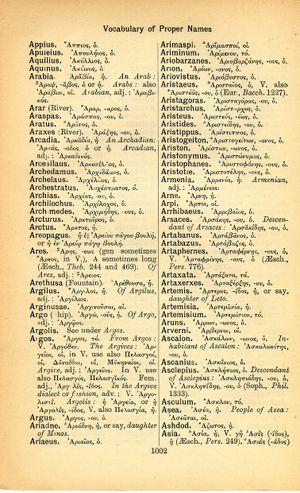Arsaces
οὐκ ἐπιλογιζόμενος ὅτι ἅμα μὲν ὀδύρῃ τὴν ἀναισθησίαν, ἅμα δὲ ἀλγεῖς ἐπὶ σήψεσι καὶ στερήσει τῶν ἡδέων, ὥσπερ εἰς ἕτερον ζῆν ἀποθανούμενος, ἀλλ᾿ οὐκ εἰς παντελῆ μεταβαλῶν ἀναισθησίαν καὶ τὴν αὐτὴν τῇ πρὸ τῆς γενέσεως → you do not consider that you are at one and the same time lamenting your want of sensation, and pained at the idea of your rotting away, and of being deprived of what is pleasant, as if you are to die and live in another state, and not to pass into insensibility complete, and the same as that before you were born
English > Greek (Woodhouse)
Ἀρσάκης, -ου, ὁ.
Descendant of Arsaces: Ἀρσακίδης, -ου, ὁ.
Latin > English (Lewis & Short)
Arsăces: is m., = Ἀρσάκης,
I the first king of the Parthians, Just. 41, 5.—
II Derivv.
A Arsăcĭdae, ārum, m. (gen. plur. Arsacidūm, Luc. 10, 51), successors of Arsaces, Tac. H. 1, 40; Luc. 1, 108; 8, 217; 8, 306 al.—
B Arsăcĭus, a, um, adj., Arsacian, poet. for Parthian, Mart. 9, 36.
Latin > French (Gaffiot 2016)
Arsăcēs,¹³ is, m. (Ἀρσάκης), roi des Parthes : Just. 41, 5, 5 || -cĭdæ, ārum, m., Arsacides [descendants d’Arsacès] : Luc. 1, 108 ; 8, 217 ; 8, 306 || -cĭus, a, um, des Arsacides, des Parthes : Mart. 9, 35, 3.
Latin > German (Georges)
Arsacēs, is, Akk. ēn, m. (Ἀρσάκης), erster König u. Stifter der Dynastie der Arsaciden in Parthien (um 250 v. Chr.), Sall hist. fr. 4, 61 (19). Iustin. 14, 4, 6 sq. u. 41, 5, 5 sqq u. prol. 35. Amm. 23, 6, 2 u. 5: ein Nachkomme desselben um 35 v. Chr., Tac. ann. 6, 31. – Dav.: a) Arsacidēs, ae, m. (Ἀρσακίδης), einer aus der Dynastie des Arsaces, ein Arsacide, Iustin. 36, 1, 3; 38, 9, 3. Amm. 23, 6, 6; öfter Plur. Arsacidae, dārum u. dûm, m., die Arsaciden, Tac., Lucan. u.a.: dah. poet. für Parther übh., Lucan. 10, 51. Sil. 3, 467 (an beiden Stellen der Genet. Arsacidûm). – b) Arsacius, a, um, arsacisch, poet. = parthisch, aula, Mart. 9, 35, 3: domus (Plur.), Sidon. carm. 2, 450.

